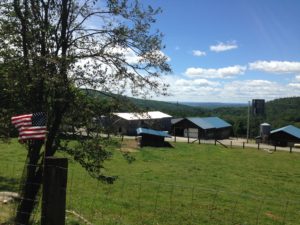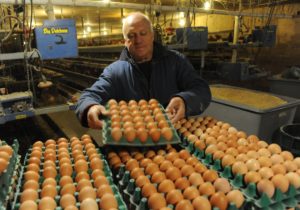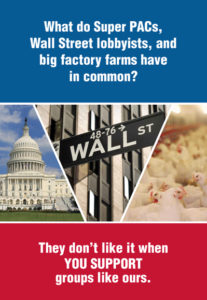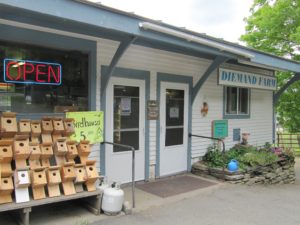
The vast scale of our industrial food system produces many contradictions, odd alliances, and hard-to-fathom dramas. One of those is playing out right now in Massachusetts, with a nationally-led animal rights campaign trying to fix a problem that barely exists in the state and a small western Massachusetts poultry farm finding itself suddenly cast as a villain in the long-running debate over the humane treatment of farm animals.
There are a lot of questions here—who should regulate animal welfare, how to make farm policy responsive to both consumers and producers, whether we should be eating animals at all—but one that’s gone largely unnoticed has to do with scale itself. The fate of Diemand Farm’s commercial egg operation may tell us a good deal about whether we’re going to be able to create a food system that’s fair to humans and non-human species as well as the environments that support them—at a scale large enough to give everyone access to healthy food from nearby sources.
First, some background. Following earlier failed attempts (including a 1988 ballot question and a bill filed in 2011), a coalition of animal-rights advocates calling itself Citizens for Animal Farm Protection, spear-headed by the Washington DC-based Humane Society of the United States (HSUS), is on the verge of getting a question onto this fall’s ballot that would ban the sale of eggs and meat in Massachusetts from animals raised using certain confinement practices, including keeping egg-laying hens in cages.
Opposition to the ballot campaign includes the state Farm Bureau and a rather motley crew of allies, ranging from representatives of large-scale industrialized agriculture like the National Pork Producers Council to the anti-government-regulation, pro-GMO organization Protect the Harvest, whose motto is “Keeping America free, fed, and fun!” and whose executive director attributes his competitive success to his high-protein, red-meat-centered diet.
Also on board are anti-poverty activists concerned that the new regulations would raise egg prices and harm low-income consumers in need of affordable protein—a position that sidesteps the many hidden health costs of the system that keeps industrially-produced food cheap. Add to this an attorney who is on the record comparing welfare recipients to scavenging raccoons and you have some idea of how hard it can be to frame a clear public debate about these kinds of issues.
One of the objections put forward by this group is that the ballot initiative isn’t actually needed in Massachusetts. With a relatively limited land base, farms here tend to be diversified and relatively small, and the state has never developed the kind of giant “factory farms” that exist in many other parts of the country. No Massachusetts farmers currently use pig gestation crates or close confinement for veal calves, two of the three techniques being targeted. And only a single commercial-scale egg operation—you guessed it, Diemand Farm of Wendell—keeps its laying hens in cages.

The Diemands—sisters Anne and Faith and brother Peter—make a strong case that their practices are in fact humane. They point to decades of family experience trying to protect a large outdoor flock from predators, birds smothering each another in panicked pile-ups during thunderstorms, and occasional chicken-on-chicken violence and even cannibalism (as Anne Diemand Bucci told the Greenfield Recorder, “The pecking order is real”).
Visitors and fellow farmers confirm that there is a visible and audible level of contentment among the 3,000 hens in the Diemands’ 12 by 18 inch cages. Unlike the much more cramped spaces of very large operations that may house more than half a million birds generating massive amounts of waste, those individual cages offer the chickens sufficient room to stretch (“They extend one wing and then the other over their backs,” Bucci points out, countering ballot proponents’ claim that chickens need to be able to flap both wings freely). At this scale, it’s also much easier to clean the barn thoroughly, keeping the birds, their eggs, and the human workers healthier.
The Diemands and their supporters would like to see livestock policies driven by a better-informed sense of the range of ethical practices among farmers rather than by consumers’ understandable but simplistic responses to the most horrific abuses. (A bill filed by Representative Steve Kulik of Worthington attempts to find middle ground by creating a Livestock Care and Standards Board with representation from animal rights groups as well as farmers, but that legislation will likely fizzle if the ballot initiative is successful.)
This whole line of argument is a reasonable one. But it may miss the main point of the ballot campaign, which isn’t really about in-state farming conditions. Rather, the activist coalition seems to be aiming to mobilize consumer sentiment here in liberal, relatively affluent Massachusetts to send a message to large-scale food producers outside the state that the tide of public opinion is turning against the increasingly well-documented problems with large-scale agriculture.
The fact that this would be more symbolic than economic—Massachusetts accounts for only two percent of the national egg market—is beside the point. It would be a step in the longer game of mobilizing public opinion to challenge “big ag.”

In the battle to scale industrial agriculture back to something more just and accountable, Diemand Farm’s egg operation may simply be collateral damage. Taking a charitable view, it may even be that the ballot campaign was launched here because so few smaller producers would be harmed in the process. (Looking at it more cynically, it’s certainly easier to challenge massive agricultural corporations if they aren’t a major economic force in the state you’re targeting.)
So if Diemand Farm decides to get out of the commercial egg market—the likely outcome if the ballot initiative passes—would that be worth it in the long run? Is this just a growing pain—or perhaps a “de-growing” pain—in the broader effort to remake our food systems?
This is where it really matters to think about scale and to keep large-scale problems and solutions from blinding us to existing smaller-scale strategies. Food activists are trying to figure out how best to scale up the small at the same time as they’d like to see the large scaled down, and useful visions are emerging that point us toward a more varied, environmentally- and socially-responsible, regionally- and locally-rooted food system for New England.

But with its niche somewhere between a small diversified farm and a mid-sized specialized operation, Diemand Farm already provides the kind of alternative to “big ag” that can help us to move in that direction. The farm is local enough to be embedded in its community and transparent about its methods. But unlike many small farms, it also has the capacity to sell in somewhat larger commercial markets. If animal products are going to be a part of our diet, and if we’re going to have a region-centered food system that can feed a population in which the very great majority of people aren’t producing most of their own food, we urgently need these mid-scale operations, especially in the short term.
And that makes it important not to get caught in the all-or-nothing rhetoric of a referendum campaign, and to find careful and informed ways to assess farmers’ practices. There are other mid-sized egg producers in Massachusetts—for example, the Country Hen in nearby Hubbardston—whose flocks are cage-free. But unlike HSUS and its allies, those producers tend to see the Diemands’ methods as fully acceptable and ethical, just one of the many possible ways to balance the needs of humans, animals, and land.
We need to be able to hear that range of experience and opinion, and to be very careful that in the push to create ethical alternatives, we’re not losing the ones we may already have.
~ Cathy Stanton teaches Anthropology at Tufts University and lives in Wendell. She can be reached at cathy[at]cathystanton.net.
Read more about this story in the Guardian and the Greenfield Recorder.
Thank you for this clear calm reasonable exposition. It’s dearly needed to explain the how’s and whys of making sensible changes in farm policy and practice. “Sustainability” has to include the farmer and the consumer in its arithmetic.
Thanks, Rachel. I do think there are strong arguments on both sides – but it would just be good to have that “clear calm reasonable” discussion about it!
Cathy,
This is excellent. I am so glad to have it to reference when asked about this issue. I know you are modest but I encourage you to share this widely with local food organizations and networks as an important read to help caring consumers and voters understand the issue and ballot question history and implications. Let me know if I can help.
Deb
Thanks, Deb!
Having known the family and the family and going there frequently over the years. They are the most humane kind honest hard working educated people. The run a small family business and do take good care of the chickens that produce the eggs that produce the income. To lump them in with factory farming is terrible. This was a great article and its too bad more people did not educate themselves before they spoke. However the harsh reality too is we all eat and if you choose to eat fish, meat,eggs they are most likely farmed. I prefer to know it was a small local farm which I feel is not a factory farm but its still farming on a large scale. I hope the government red tape does not destroy another honest family business.
I really feel for their plight. I started a small livestock farm 7 years ago, the next town over, because I could feel the screaming need for more – any! – small-scale farming infrastructure. The economic incentives against farming are overwhelming, especially starting from scratch! Fencing, housing, lost knowledge, time – and yet, this nation was once predominantly agrarian, and our vast land bank was used as such. Massachusetts was once predominantly deforested, in favor of farms; the forests are back, the farms are gone. In their place, we have artificially inexpensive factory-farmed food from out of state, and a (growing) number of local producers who can sell at a premium to those consumers aware and able to purchase it.
That’s a bad model. People left farms for cities, when mill cities provided jobs. The mills are gone, the cities remain, the farms are gone. We should have returned whence we came when the reason for cities vanished; we didn’t. Now we are left with an unemployable population, with no land to sustain themselves. That, is fundamentally broken.
I happened to be fortunate enough to happen onto usable land. What about the rest of us?
Big questions! And big problems, no doubt about it. I’ve been trying in this “Farm Values” project to push back a bit against some of the outlines of that narrative about New England farming, which is certainly true in its broad strokes but contains some surprising exceptions and counter-currents that may offer some inspiration as we try to rethink and rescale.
Cathy,
I greatly appreciate the ability to learn about current agricultural issues facing Massachusetts through an anthropological lens.
The farmers I know generally feel their day-to-day issues are very misunderstood by their (sometimes overly adoring, sometimes tone-deaf) public. Your writing is both unique and very needed.
-Joan S
Thanks, Joan! Yes, farmers can be equally frustrated by supporters and detractors, a facet of most people having become so distanced from the day-to-day realities of farming.